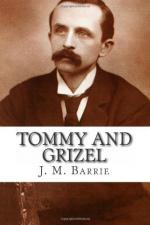Elspeth showed less contemptibly than her brother, but it was Grizel who did most of the talking. She nodded her head and smiled crookedly at Tommy, but she was watching him all the time. She wore a dress in which brown and yellow mingled as in woods on an autumn day, and the jacket had a high collar of fur, over which she watched him. Let us say that she was watching to see whether any of the old Tommy was left in him. Yet, with this problem confronting her, she also had time to study the outer man, Tommy the dandy—his velvet jacket (a new one), his brazen waistcoat, his poetic neckerchief, his spotless linen. His velvet jacket was to become the derision of Thrums, but Tommy took his bonneting haughtily, like one who was glad to suffer for a Cause. There were to be meetings here and there where people told with awe how many shirts he sent weekly to the wash. Grizel disdained his dandy tastes; why did not Elspeth strip him of them? And oh, if he must wear that absurd waistcoat, could she not see that it would look another thing if the second button was put half an inch farther back? How sinful of him to spoil the shape of his silly velvet jacket by carrying so many letters in the pockets! She learned afterwards that he carried all those letters because there was a check in one of them, he did not know which, and her sense of orderliness was outraged. Elspeth did not notice these things. She helped Tommy by her helplessness. There is reason to believe that once in London, when she had need of a new hat, but money there was none, Tommy, looking very defiant, studied ladies’ hats in the shop-windows, brought all his intellect to bear on them, with the result that he did concoct out of Elspeth’s old hat a new one which was the admired of O.P. Pym and friends, who never knew the name of the artist. But obviously he could not take proper care of himself, and there is a kind of woman, of whom Grizel was one, to whose breasts this helplessness makes an unfair appeal. Oh, to dress him properly! She could not help liking to be a mother to men; she wanted them to be the most noble characters, but completely dependent on her.




